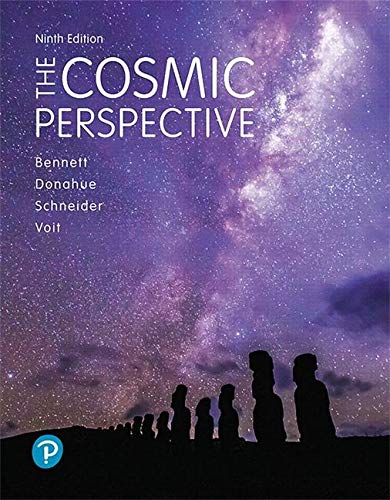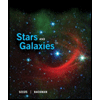
The Cosmic Perspective (9th Edition)
9th Edition
ISBN: 9780134874364
Author: Jeffrey O. Bennett, Megan O. Donahue, Nicholas Schneider, Mark Voit
Publisher: PEARSON
expand_more
expand_more
format_list_bulleted
Textbook Question
Chapter 7, Problem 34EAP
Why Wait? To explore a planet, we often send first a flyby, then an orbiter, then a probe or a lander. There’s no doubt that probes and landers give the most close-up detail, so why don’t we send this type of mission first? For the planet of your choice, based just o the information in this chapter, give an example of why such a strategy might cause a mission to provide incomplete information about the planet or to fail outright.
Expert Solution & Answer
Want to see the full answer?
Check out a sample textbook solution
Students have asked these similar questions
2
3
Imagine you are out for a stroll on a sunny day when you encounter a lake. Unpolarized light from the sun is reflected off the lake into your eyes. However, you notice when you put on your vertically polarized sunglasses, the light reflected off the lake no longer reaches your eyes. What is the angle between the unpolarized light and the surface of the water, in degrees, measured from the horizontal? You may assume the index of refraction of air is nair=1 and the index of refraction of water is nwater=1.33 . Round your answer to three significant figures. Just enter the number, nothing else.
Chapter 7 Solutions
The Cosmic Perspective (9th Edition)
Ch. 7 - Prob. 1VSCCh. 7 - Use the following questions to check your...Ch. 7 - Use the following questions to check your...Ch. 7 - Use the following questions to check your...Ch. 7 - What do we mean by comparative planetology? Does...Ch. 7 - What would the solar system look like to your...Ch. 7 - Briefly describe the overall layout of the solar...Ch. 7 - For each of the objects in the solar system tour...Ch. 7 - Briefly describe the patterns of motion that we...Ch. 7 - What are the basic differences between the...
Ch. 7 -
7. What do we mean by hydrogen compounds? In...Ch. 7 -
8. What are asteroids? What are comets? Describe...Ch. 7 - What kind of object in Pluto? Explain.Ch. 7 - What is the Kuiper belt? What is the Oort cloud?...Ch. 7 - Describe at least two “exceptions to the rules”...Ch. 7 - Describe and distinguish between space missions...Ch. 7 - Does it Make Sense? Decide whether the statement...Ch. 7 - Does it Make Sense? Decide whether the statement...Ch. 7 - Does it Make Sense? Decide whether the statement...Ch. 7 - Does it Make Sense? Decide whether the statement...Ch. 7 - Does it Make Sense? Decide whether the statement...Ch. 7 - Does it Make Sense? Decide whether the statement...Ch. 7 - Does it Make Sense? Decide whether the statement...Ch. 7 - Does it Make Sense? Decide whether the statement...Ch. 7 - Does it Make Sense? Decide whether the statement...Ch. 7 - Does it Make Sense? Decide whether the statement...Ch. 7 - Choose the best answer to each of the following....Ch. 7 - Choose the best answer to each of the following....Ch. 7 - Choose the best answer to each of the following....Ch. 7 - Choose the best answer to each of the following....Ch. 7 - Choose the best answer to each of the following....Ch. 7 - Choose the best answer to each of the following....Ch. 7 - Choose the best answer to each of the following....Ch. 7 - Choose the best answer to each of the following....Ch. 7 - Choose the best answer to each of the following....Ch. 7 - Choose the best answer to each of the following....Ch. 7 - Why Wait? To explore a planet, we often send first...Ch. 7 - Prob. 35EAPCh. 7 - Prob. 37EAPCh. 7 - Patterns of Motion. In one or two paragraphs,...Ch. 7 - Solar System Trends. Answer the following based on...Ch. 7 - Comparing Planetary Conditions. Use both Table 7.1...Ch. 7 - Prob. 41EAPCh. 7 - Size Comparisons. How many Earths could fit inside...Ch. 7 - Asteroid Orbit. Ceres, the largest asteroid, has...Ch. 7 - Density Classification. Calculate the density of a...Ch. 7 - Comparative Weight. Suppose you weigh 100 pounds....Ch. 7 - New Horizons Speed. On its trajectory to Pluto,...Ch. 7 - Planetary Parallax. Suppose observers at Earth’s...
Knowledge Booster
Learn more about
Need a deep-dive on the concept behind this application? Look no further. Learn more about this topic, physics and related others by exploring similar questions and additional content below.Similar questions
- 20. Two small conducting spheres are placed on top of insulating pads. The 3.7 × 10-10 C sphere is fixed whie the 3.0 × 107 C sphere, initially at rest, is free to move. The mass of each sphere is 0.09 kg. If the spheres are initially 0.10 m apart, how fast will the sphere be moving when they are 1.5 m apart?arrow_forwardpls help on allarrow_forwardpls help on thesearrow_forward
- pls help on all asked questions kindlyarrow_forwardpls help on all asked questions kindlyarrow_forward19. Mount Everest, Earth's highest mountain above sea level, has a peak of 8849 m above sea level. Assume that sea level defines the height of Earth's surface. (re = 6.38 × 106 m, ME = 5.98 × 1024 kg, G = 6.67 × 10 -11 Nm²/kg²) a. Calculate the strength of Earth's gravitational field at a point at the peak of Mount Everest. b. What is the ratio of the strength of Earth's gravitational field at a point 644416m below the surface of the Earth to a point at the top of Mount Everest? C. A tourist watching the sunrise on top of Mount Everest observes a satellite orbiting Earth at an altitude 3580 km above his position. Determine the speed of the satellite.arrow_forward
- pls help on allarrow_forwardpls help on allarrow_forward6. As the distance between two charges decreases, the magnitude of the electric potential energy of the two-charge system: a) Always increases b) Always decreases c) Increases if the charges have the same sign, decreases if they have the opposite signs d) Increases if the charges have the opposite sign, decreases if they have the same sign 7. To analyze the motion of an elastic collision between two charged particles we use conservation of & a) Energy, Velocity b) Momentum, Force c) Mass, Momentum d) Energy, Momentum e) Kinetic Energy, Potential Energyarrow_forward
arrow_back_ios
SEE MORE QUESTIONS
arrow_forward_ios
Recommended textbooks for you
 AstronomyPhysicsISBN:9781938168284Author:Andrew Fraknoi; David Morrison; Sidney C. WolffPublisher:OpenStax
AstronomyPhysicsISBN:9781938168284Author:Andrew Fraknoi; David Morrison; Sidney C. WolffPublisher:OpenStax Foundations of Astronomy (MindTap Course List)PhysicsISBN:9781337399920Author:Michael A. Seeds, Dana BackmanPublisher:Cengage Learning
Foundations of Astronomy (MindTap Course List)PhysicsISBN:9781337399920Author:Michael A. Seeds, Dana BackmanPublisher:Cengage Learning

 An Introduction to Physical SciencePhysicsISBN:9781305079137Author:James Shipman, Jerry D. Wilson, Charles A. Higgins, Omar TorresPublisher:Cengage Learning
An Introduction to Physical SciencePhysicsISBN:9781305079137Author:James Shipman, Jerry D. Wilson, Charles A. Higgins, Omar TorresPublisher:Cengage Learning Stars and GalaxiesPhysicsISBN:9781305120785Author:Michael A. Seeds, Dana BackmanPublisher:Cengage Learning
Stars and GalaxiesPhysicsISBN:9781305120785Author:Michael A. Seeds, Dana BackmanPublisher:Cengage Learning

Astronomy
Physics
ISBN:9781938168284
Author:Andrew Fraknoi; David Morrison; Sidney C. Wolff
Publisher:OpenStax

Foundations of Astronomy (MindTap Course List)
Physics
ISBN:9781337399920
Author:Michael A. Seeds, Dana Backman
Publisher:Cengage Learning



An Introduction to Physical Science
Physics
ISBN:9781305079137
Author:James Shipman, Jerry D. Wilson, Charles A. Higgins, Omar Torres
Publisher:Cengage Learning

Stars and Galaxies
Physics
ISBN:9781305120785
Author:Michael A. Seeds, Dana Backman
Publisher:Cengage Learning
Time Dilation - Einstein's Theory Of Relativity Explained!; Author: Science ABC;https://www.youtube.com/watch?v=yuD34tEpRFw;License: Standard YouTube License, CC-BY